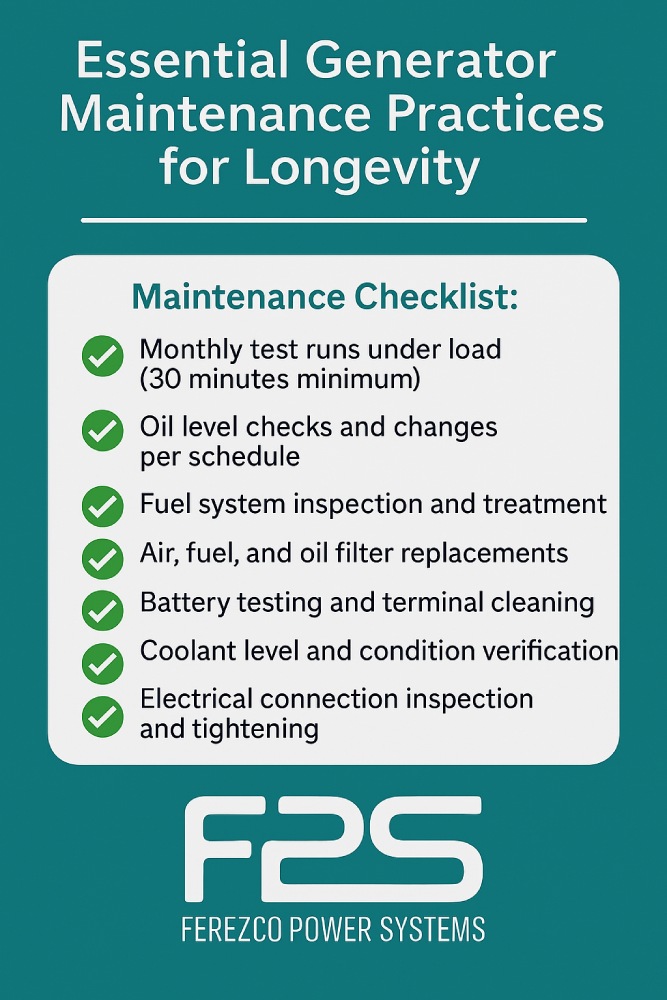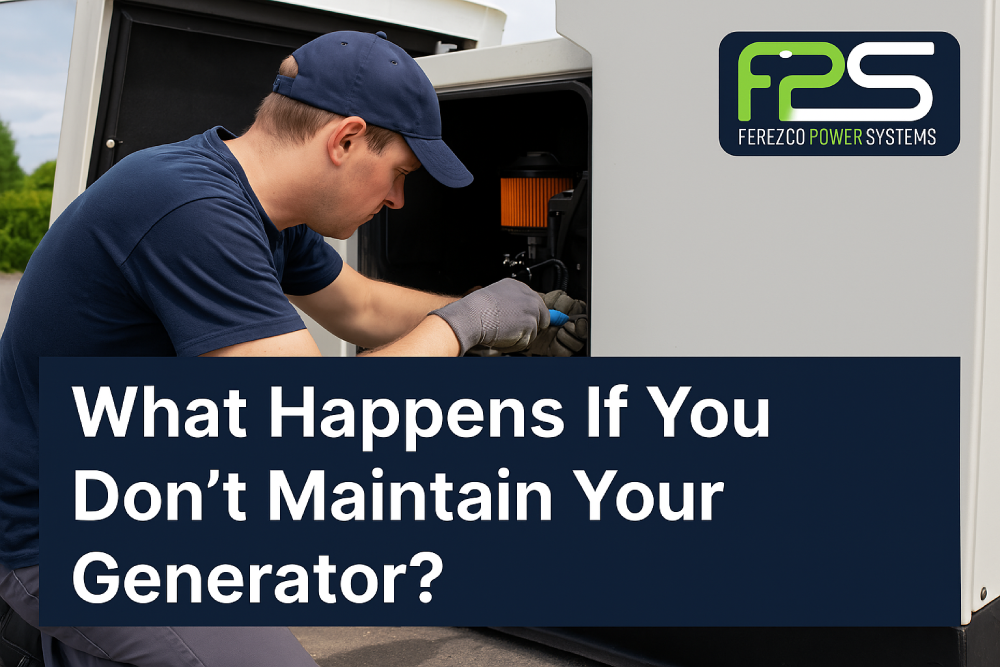Whenever the power goes out, a working generator can be the savior from the blackouts. Generators are a rather large purchase, and it is right that they require appropriate care and maintenance. But many times, many owners simply do not take care of generator maintenance, which brings a lot of trouble to them that could have been easily avoided.
FYI: Regular generator maintenance is not optional. It is actually essential for reliability, safety, and protecting the machine when emergency backup power is needed most.
What Happens When You Don’t Maintain Your Generator?
Generators don’t usually fail out of nowhere without any warning signs. Instead, it is the neglected maintenance that ends up in bad performance. So, when these machines sit unused for long periods without proper care, a lot of issues begin to come up.
Fuel degradation is one of the most common problems. Modern fuel starts to break down in 30 days. It forms gummy deposits that clog the fuel lines and injectors. They then stop the fuel flow and prevent the generator from starting, which eventually causes it to run inefficiently.
Apart from fuel issues, lack of regular operation also allows moisture to collect in the system. This moisture, then, leads to corrosion of metal parts which ends in degraded electrical connections and weak mechanical parts. When it is left unchecked, a minor rust turns into a serious structural problem that compromises the whole system.
Did you know? Using fuel stabilizer for generators can prevent fuel degradation for up to 24 months. It increases the usability of stored fuel in your emergency backup power system.
Related: How To Connect a Generator To Your House Without a Transfer Switch?
Early Warning Signs of Poor Generator Maintenance
Before complete failure happens, neglected generators show bad performance. You would notice the generator taking a little longer to start or struggling to maintain and give you consistent power. You shouldn’t ignore these signs as they are warning you about your generator’s health.
Voltage fluctuations are another common issue with poorly maintained generators. These fluctuations can damage sensitive electronic parts that are connected to the generator. This can end up with costly equipment repairs and replacements.
Fuel efficiency also suffers a lot when there is no maintenance. A generator that used to run for hours on a single tank is now using a lot more fuel will end up raising operating costs. This also means that the generator may not provide power for as long as expected during an emergency.
Warning Signs to Watch For:
- Difficulty starting or frequent stalling
- Unusual noises during operation
- Visible exhaust smoke
- Decreased power output
- Increased fuel consumption
- Irregular voltage readings
Generator Failure Risks Due to Lack of Maintenance
If there has been no maintenance for a long time, then the chances of your generator failing increase. It accelerates component wearing, which means that problems compound quickly once they begin to develop.
The engine, being the heart of any generator, usually suffers the most. Without regular oil changes, internal engine parts have increased friction and heat. This wear can seize engines that need complete replacement, and it is usually at the cost of a new generator.
Alternator failures are another serious consequence of poor maintenance. The alternator converts mechanical energy from the engine into electrical output. So, when dust, moisture, and debris get collected in this unserved part, the insulation breaks down and windings can short-circuit. It makes the generator useless even if the engine is running perfectly.
Control system malfunctions also become more common in neglected generators. Modern generators depend on electronic controls to regulate output and protect connected equipment. These sensitive systems can fail when it is not regularly checked and tested. It leads to situations where the generator might run but not give you usable power.
Important Components at Risk:
- Engine internals (pistons, bearings, valves)
- Alternator windings and brushes
- Electronic control modules
- Transfer switches
- Cooling systems
Safety Hazards of Improper Generator Maintenance
Beyond performance issues and mechanical failures, poorly maintained generators have genuine safety risks. They are beyond the generator itself and threaten property and people.
Fuel leaks develop more frequently as seals worsen and fuel lines crack. These leaks create fire hazards, especially when the generator works at high temperatures. With this, improper combustion due to clogged air filters or fuel injectors can produce dangerous carbon monoxide. It is a colourless, odorless gas that can be lethal in closed spaces.
Electrical hazards also increase with generator neglect. Damaged wiring insulation, loose connections, and rusted parts can lead to short circuits, electrical fires, and shocks. These risks are more in portable generator care because they are moved frequently which puts the electrical components under physical stress.
Safety Risk Factors:
- Carbon monoxide production from incomplete combustion
- Fuel leaks create fire hazards
- Electrical shorts causing shock or fire risks
- Overheating leading to thermal runaway
- Unstable operation is damaging connected equipment
Financial Impact of Skipping Generator Maintenance
The economic impact of skipping generator maintenance extends far beyond repair costs. For businesses, an unreliable generator means vulnerability to power outages that can stop operations, spoil the inventory, and even disappoint the customers. Even a small downtime can end up in revenue losses that dwarf the cost of routine maintenance.
For homeowners, a failed generator in a long power outage can end up with damages like frozen pipes, flooded basements from inoperable sump pumps, or food spoilage. These consequences usually cost many times more than maintaining the generator would have.
The lifespan reduction is the long-term financial impact. Properly maintained generators usually last 15-20 years or more, while neglected units fail within 5-7 years. This early replacement doubles or triples the lifetime cost of generator ownership.
Cost Comparison:
- Average annual maintenance cost: $200-400
- Major repair after neglect: $1,000-3,000
- Complete generator replacement: $5,000-20,000+
- Business downtime costs: $10,000+ per day for many operations
- Home damage from power loss: Potentially thousands in repairs
Essential Generator Maintenance Practices for Longevity
Avoiding these issues involves putting into practice a regular maintenance routine.
This does not have to be overly complicated or time-consuming, but must be regular and precise.
Fluid maintenance is another part of generator maintenance. Oil changes regularly prevent engine wear, while fuel treatments stabilize it in storage to avoid breakdown. Checking coolant levels and conditions help protect engines from overheating and rusting in cooling systems.
Filter replacement should be done according to the manufacturer’s recommendations. It should be frequent if there is a dusty environment. Clean air filters and make sure proper combustion, while fresh fuel filters prevent contaminants from reaching sensitive system parts. Oil filters also need regular replacement to maintain proper lubrication throughout the engine.
Battery maintenance cannot be ignored, as starting failures commonly come from neglected batteries. Keeping terminals clean, checking connections, and testing battery capacity regularly prevents the frustration of a generator that won’t start when needed.
Maintenance Checklist:

- Monthly test runs under load (30 minutes minimum)
- Oil level checks and changes per schedule
- Fuel system inspection and treatment
- Air, fuel, and oil filter replacements
- Battery testing and terminal cleaning
- Coolant level and condition verification
- Electrical connection inspection and tightening
Why Professional Generator Service Matters
While owner-performed maintenance mostly covers the basics, professional service is important for detailed generator care. Trained technicians bring specialized equipment and expertise that help them in identifying problems before they fail.
Annual professional inspections should include detailed examinations of electrical systems, including load testing and transfer switches. Technicians can properly check insulation resistance, loose connections, and the protective system that might go unnoticed.
Detailed engine diagnostics performed by professionals provide a deeper look into engine health. These diagnostics include compression testing, exhaust analysis, and internal part inspection that usually exceeds the capabilities of most owners.
Professional maintenance also makes sure of warranty requirements. Many generator warranties specify professional servicing at certain intervals. Failing to maintain these schedules can cancel the warranty coverage when you need it the most.
Professional Services Include:
- Load bank testing to verify full capacity operation
- Transfer switch inspection and testing
- Detailed electrical system evaluation
- Advanced diagnostic testing
- Warranty-compliant service documentation
- Firmware updates for control systems
How to Create an Effective Generator Maintenance Schedule
Developing a maintenance schedule that works for your specific situation helps with consistency. This schedule should consider both regular owner-performed maintenance and professional servicing intervals.
Documentation plays an important role in maintenance programs. Keeping detailed records of all maintenance activities, including dates, services performed, and observations, helps in tracking the generator’s history. You can also easily identify the patterns and other developing problems.
Seasonal considerations should factor into maintenance planning as well. Generators face different challenges depending on the climate and time of year. In cold areas, winter preparation includes fuel treatments to prevent gelling and battery maintenance to make sure of starting power. Summer preparation focuses more on cooling system maintenance and ensuring ventilation.
Schedule Components:
- Weekly visual inspections
- Monthly test runs and operational checks
- Fluid and filter evaluation once in three months
- Semi-annual battery maintenance
- Annual professional service
- Seasonal preparations (spring/full)
The Value of Preventive Generator Maintenance vs. Reactive Repairs
Ultimately, generator maintenance is a choice between prevention and reaction. Preventive maintenance needs predictable investments of time and money spread over the generator’s lifetime. Reactive approaches, waiting until problems come up, cost more and end up with higher risks.
When evaluating maintenance costs, consider the real price of generator failure. This is not only the cost of repair but also the financial loss of being powerless during the worst of times. For businesses, this could be lost income, lost reputation, or lost inventory. For homeowners, it could be damage to property or personal inconvenience during weather crises.
The sense of security that results from a well-maintained generator. The knowledge that you can count on your generator in an emergency frees you up to attend to other matters in stressful situations.
Cost-Benefit Analysis:
- Preventive Maintenance: Scheduled, predictable expenses
- Reactive Repairs: Unexpected, usually higher costs
- Reliability Factor: Maintained generators work when needed (95 %+ reliability)
- Neglected Generators: High failure rate during emergencies (50 %+ failure rate)
Why Generator Maintenance Is Essential: Conclusion
Generator maintenance should not be seen as an optional expense but as an important part of generator ownership. The consequences of neglect extend beyond the generator itself to affect safety, finances, and reliability when power matters most.
By knowing what happens when generator maintenance is ignored, owners can make informed decisions about prioritizing proper care. This investment in regular maintenance repays itself through longer generator life, higher reliability, and lower total cost of ownership.
Whether your generator serves as emergency backup power for your home or provides necessary power protection for your business. A good, detailed maintenance program is the best way to protect your investment and make sure your power needs are covered when grid power fails.
Remember: A well-maintained generator is a reliable generator. Don’t wait until an emergency tells you about maintenance problems that could have been easily taken care of.
For more such information, contact Ferezco Power System.
Related: How Much Electricity Does AC Units Use? A Comprehensive Comparison




